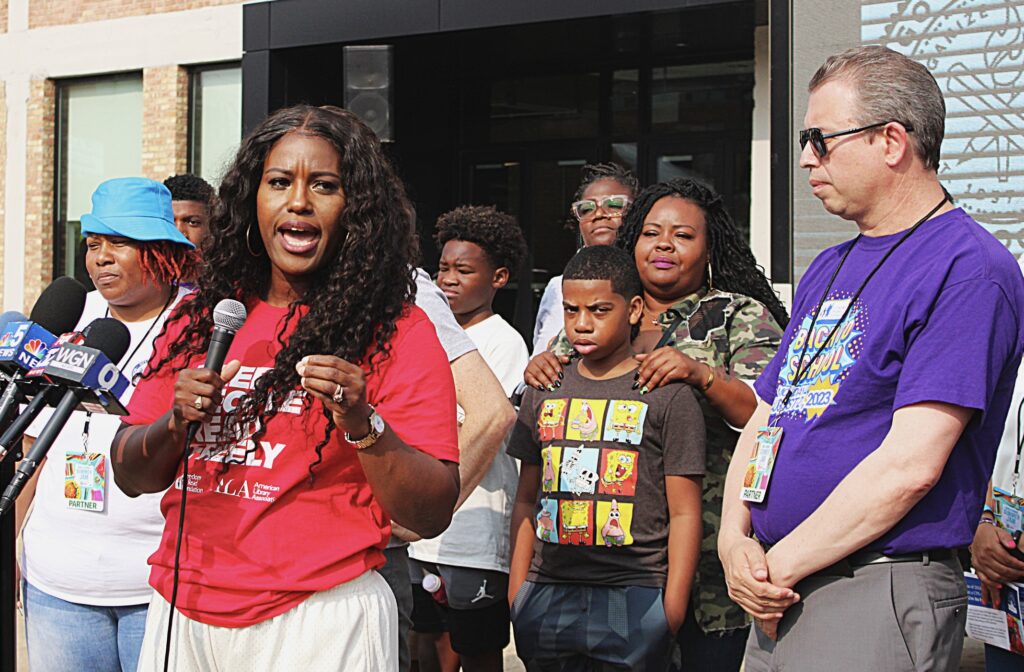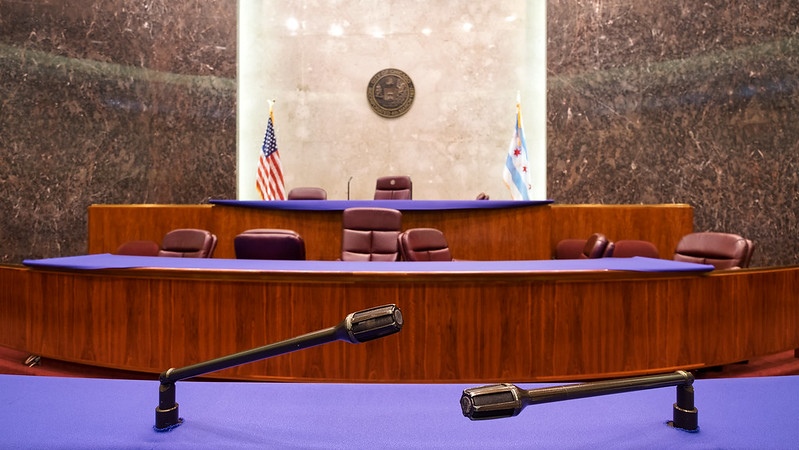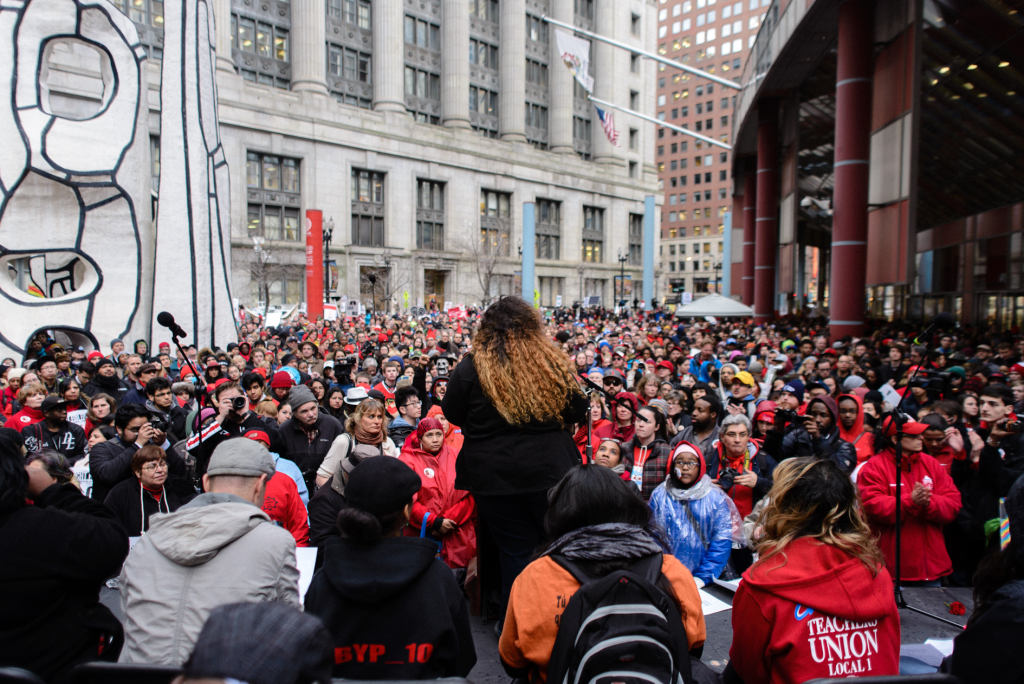Chicago Public Schools CEO Pedro Martinez appeared before the City Council’s Committee on Education and Child Development Wednesday to discuss the ongoing turmoil at the Board of Education. Despite having also been invited by the Council, not one current or former member of the Board accompanied him.
Last week, alders demanded the board members show up and answer questions about the budget woes facing the school district. Those expectations were tempered, however, by Corporation Counsel Mary Richardson-Lowry, who stated that the Council has no subpoena power over CPS, since it’s a separate agency from the City.
That fact didn’t stop some alders from expressing their frustration over the lack of attendance.
“For the school board members who are ghosting us today and should be sitting in front of us,” said Ald. Scott Waguespack (32nd). “If we’re going to be asked to do all these things as a city, everything from changing priorities on TIFs…taking a ‘payday loan,’ asked to do property tax hikes, then that board better show up here, and they better start showing up in public and providing answers. And we shouldn’t have to ask.”
On October 7, Mayor Brandon Johnson appointed six new members to the board days after all seven of his handpicked members resigned rather than weigh in on the fracas with Martinez. Johnson, a former teacher and CTU organizer, has clashed with Martinez over the CEO’s refusal to take on a $300 million high-interest loan to cover pensions and the costs of Chicago Teachers Union (CTU) contracts.
As the lone CPS official at the board hearing, Martinez was grilled by alders on his plans to keep CPS afloat. With the expiration of federal COVID-19 relief dollars, CPS faces a $500 million deficit. Martinez has argued that taking on the loan would be a fiscally irresponsible way to plug the district’s budget holes. Instead, he implored alders to explore an alternative funding source: tapping into the city’s tax increment financing districts, or TIFs.
TIF districts were originally created to develop neighborhoods in Chicago by freezing the property tax revenue of that area while the incremental growth in property taxes is siphoned into the TIF fund. Those funds are meant to spur development within the TIF district. If there’s money left over after those funds are spent on earmarked projects, the City declares a TIF surplus. Over the years, it has become common practice for the city to dip into its TIF surplus to help cover budget deficits.
CPS already receives 52 percent of funding when the city claims a TIF surplus. Since 2019, the district has relied on $97 million in TIF funding annually for its baseline revenue, according to CPS.
Martinez is asking the city for more than $480 million from TIFs, which would require the mayor to declare a TIF surplus of nearly a billion dollars. But that could jeopardize the developments that TIFs were meant for in the first place.
“Why would I take money from East and West Garfield Park, from North Lawndale, from Austin to send it to Sauganash, Rogers Park, all over the city, to bail out CPS?” asked Ald. Jason Ervin (28th).
Ervin also zeroed in on an analysis CPS conducted on potential school closures. Martinez contended that CPS needed to undertake the analysis in order to make its case for continuing to invest in schools with low populations.
“Were you here last time that we had to close fifty schools? That was national news,” Ervin said to Martinez. “At the expense of Black communities. At the expense of us having to answer questions again about consolidations and closures, for a [question] that you knew the answer to, and if you didn’t, shame on you.”
At one point during the meeting, both Ald. Anthony Beale (9th) and Ervin grew frustrated as they pressed Martinez over the exact amount of TIF surplus money CPS would need.
“You’re asking for a billion dollars, right?” Ervin asked. “It’s ok, you can say it. We’re not gonna shoot you—today.”
Though Martinez received pushback from alders over the potential use of the TIF, he gained an important endorsement from Ald. Pat Dowell (3rd), who chairs the Committee on Finance.
“I think I understand you’re calling for a short-term, what I would call a bridge grant, to get us through next year,” Dowell told Martinez. “I feel that and support that versus a long-term ‘payday’ loan.”
As budget pressures threaten to squeeze CPS, Martinez told alders that cuts wouldn’t happen this school year, adding that the district could face a higher risk of cuts next year if they can’t secure more funding. Last month, the school board unanimously approved a moratorium on district-managed school closings until 2027.
“Our resolution is very clear…under my leadership you’re not going to see more closures,” Martinez said. “It’s not worth the trust we lose with the community.”
Still unclear is how the closure of seven Acero charter schools would be affected by the moratorium. The announcement of the closures came as a surprise to parents—and even to Martinez.
“We found out hours or the day before everybody else found out,” he said. “So we’re still working with the organization. I still want to understand what is happening there.”

In an interview Wednesday, CTU president Stacy Davis Gates blasted the news of potential school closures.
“[Former mayor] Rahm Emanuel closed fifty Black schools in 2013. Ten years later, all of the research says it was one of the biggest mistakes,” Davis Gates said. “It was a failure. And now you have the same people, Juan Rangel and all of his leftovers at Acero, still practicing the same failed policies.”
Davis Gates has called on CPS to absorb the Acero schools that are slated to be closed. A statement CTU released Wednesday blamed the Acero charter network’s financial woes on “irresponsible management” under Rangel, who founded the United Neighborhoods Organization (UNO) that later became Acero. Rangel could not be reached for comment.
The CTU president also criticized Martinez for what she characterized as a lackluster effort to lobby for more state funding. “It would help if [Martinez] stopped using cuts and layoffs and closures and consolidations as a revenue plan,” Davis Gates said. “We need him to have a relationship. He’s not in regular conversation with the governor. He’s not in a regular conversation with the Speaker of the House, and he’s not in a regular conversation with the Senate president.”
Martinez did not address reporters after the committee hearing.
Jim Daley contributed reporting to this story.
Leigh Giangreco is a freelance reporter based in Chicago. You can follow her work on Twitter @LeighGiangreco and at leighgiangreco.com.




